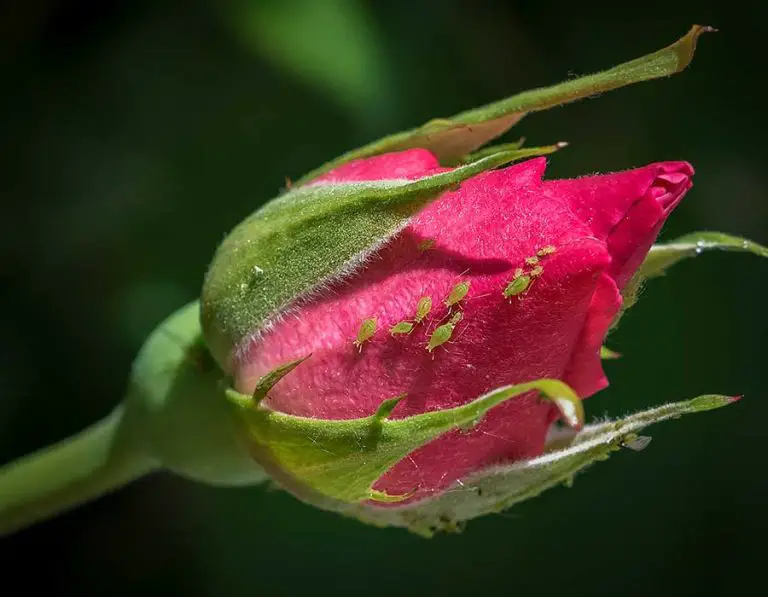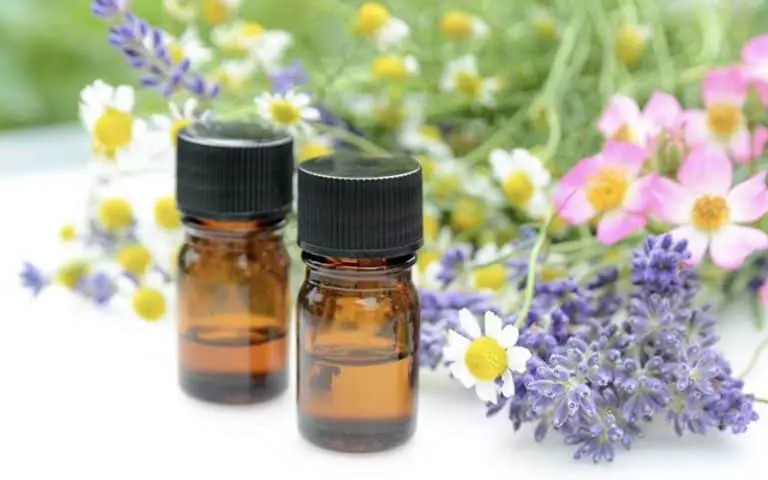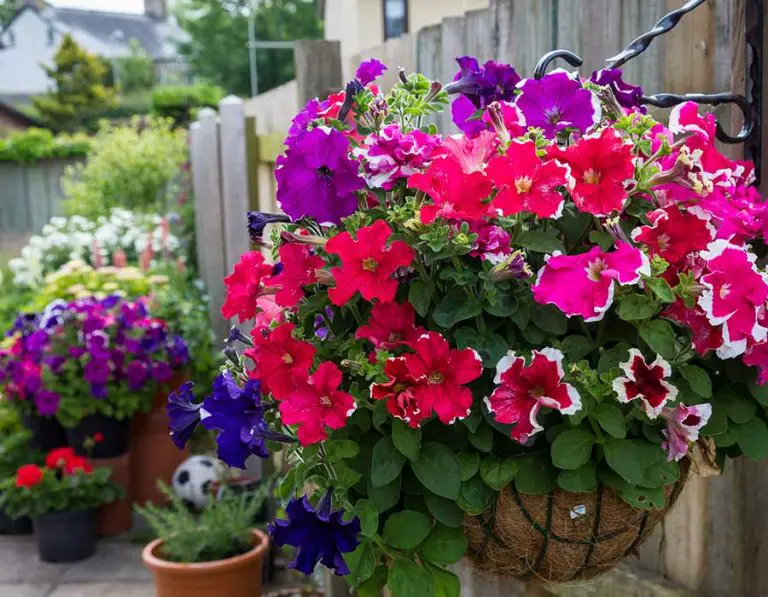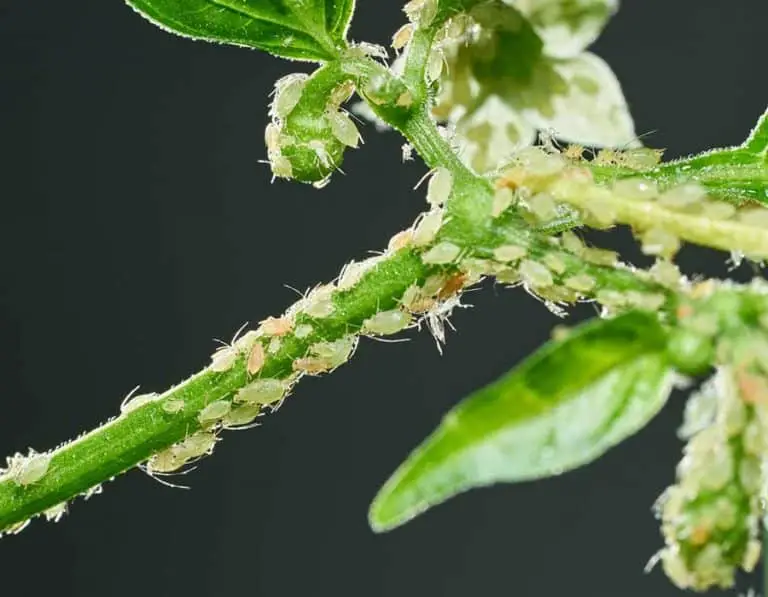Aphids On Pepper Plants – How To Treat And Prevent
Your pepper plants are one of the many crops vulnerable to aphid infestations. When these pests attack a pepper plant, they’ll feed on both the plant and its fruit; as a result, the pepper plant will suffer from stunted growth and will also produce poor-quality peppers.
It’s therefore crucial to control aphids on pepper plants as soon as you notice them to preserve your crops.
To get rid of aphids on pepper plants, you can spray the aphids off with water, kill them with DIY soap or vinegar spray, treat the plants with diatomaceous earth or neem oil, or use a chemical aphid pesticide.
To prevent future infestations of aphids on pepper plants, grow pepper companion plants, introduce natural aphid predators, and keep your pepper plants well-watered and fertilized.
What Are the Bugs on My Pepper Plants?
Aphids are not the only bugs you may encounter on your pepper plants. You may also find ants on your pepper plants, which can be a sign of an aphid infestation. Also, mites on pepper plants can appear very similar to an aphid infestation.
Aphids on Pepper Plants
If you can see tiny bugs on your pepper plants, you’re likely dealing with an aphid infestation. These small soft-bodied insects are one of the most common pests to pepper plants.
Aphid infestations can be hard to identify early on as the bugs are so small and tend to hide on the underside of leaves. They come in a variety of shapes, sizes, and colors, ranging in shades of light green to dark brown.
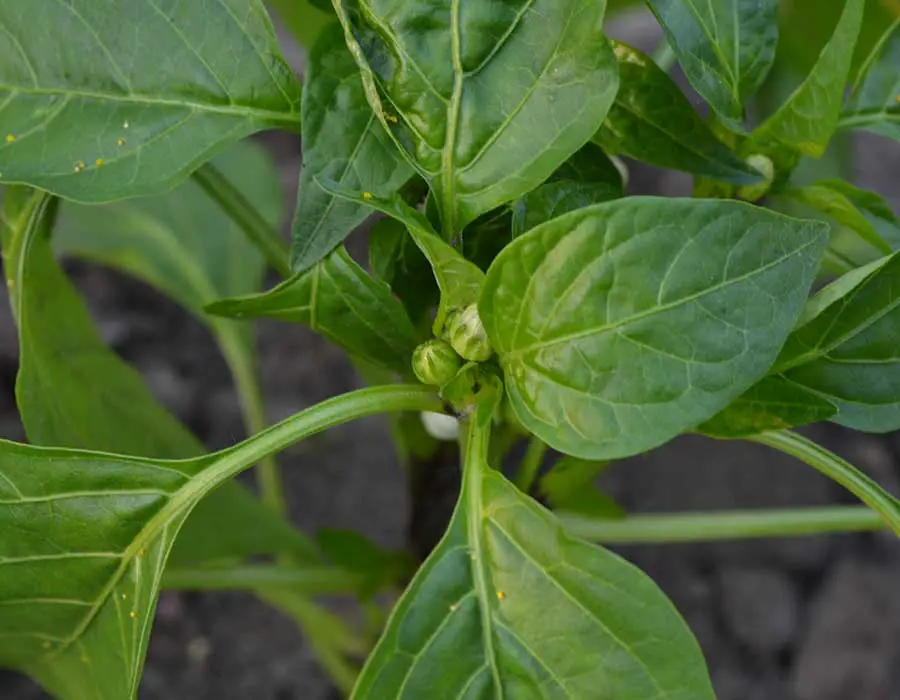
Aphids damage pepper plants by feeding on the sap in the plant’s leaves; this robs the plant of moisture and nutrients, causing stunted growth, and plant death in severe cases.
Ants on Pepper Plants
Ants are another bug that can infest your pepper plants. If there are ants on your pepper plants, this could actually be an indication of an aphid infestation.
When aphids feed on the sap from the pepper plant’s leaves, they leave a sweet sugary secretion called honeydew. Ants are drawn to the honeydew and will protect populations of aphids to secure this source of food. Although ants on pepper plants won’t damage the plants directly, they increase the presence of aphids.
Mites on Pepper Plants
Mites, or spider mites, are another common type of bug you may find on your pepper plants. Spider mites are tiny, being about the same size as a grain of sugar. As they’re so minuscule, you may need a magnifying glass to identify whether you have mites on your pepper plants.
These tiny bugs have eight legs and range in color from green, red, purple, black, to see-through; the type of mite that causes the most damage is the two-spotted mite, which is yellow-orange with a dark spot on either side of its body.
Like aphids, spider mites also suck nutrient-rich sap from your pepper plants. They will cause yellow and brown spots of damage on the pepper plant’s leaves.
What Are the Signs of Aphids on Pepper Plants?
Aside from seeing the creatures, there are a few telltale signs that indicate you’re dealing with aphids on your pepper plants. These pests typically cause the most damage to young pepper plants; they attack the leaves, stems, roots, shoots, flowers, and unripe peppers.
Other signs of aphid damage on pepper plants include:
- Curling, dry, or yellowing leaves
- Seeing honeydew (a sticky sap residue) on leaves, stems, or branches
- Branches or leaves turning black as a result of sooty mold
- Distorted peppers or flowers
- Pepper plant generally has stunted growth
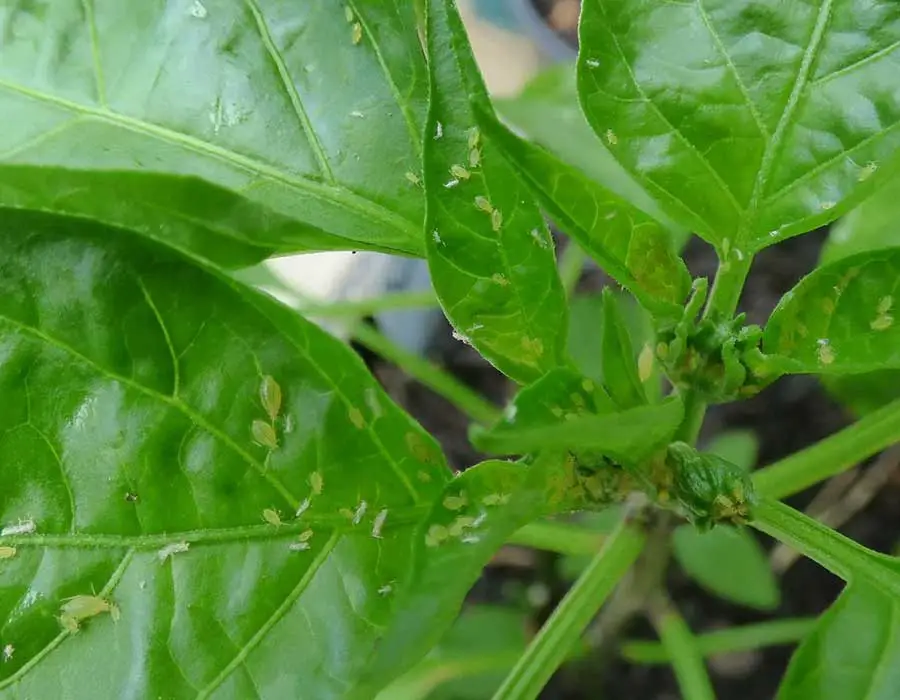
How to Get Rid of Aphids on Pepper Plants
You can get rid of aphids on pepper plants naturally using DIY soap or vinegar spray, natural vinegar spray, diatomaceous earth, or neem oil. There are also commercially-available pesticides that use chemicals to kill aphids on pepper plants quickly.
Spray Aphids Off Pepper Plants with Water
For light infestations of aphids on pepper plants, you can get rid of the bugs by spraying them with water. This is also a good technique to carry out before taking further measures to eliminate a severe infestation. The jet of water from your hose is enough to knock off a large amount of the aphids.
Method:
- Put a spray nozzle on your garden hose. Make sure the water pressure is powerful enough without being too strong; if the jet is too strong, it may break parts of your pepper plant off.
- Use your garden hose to spray the pepper plant with water. Pay particular attention to the underside of the pepper plant’s leaves as this is where the aphids will accumulate in highest numbers.
- If your infestation is severe, follow up with further measures to kill the aphids. We have gone through these methods in the following sections.
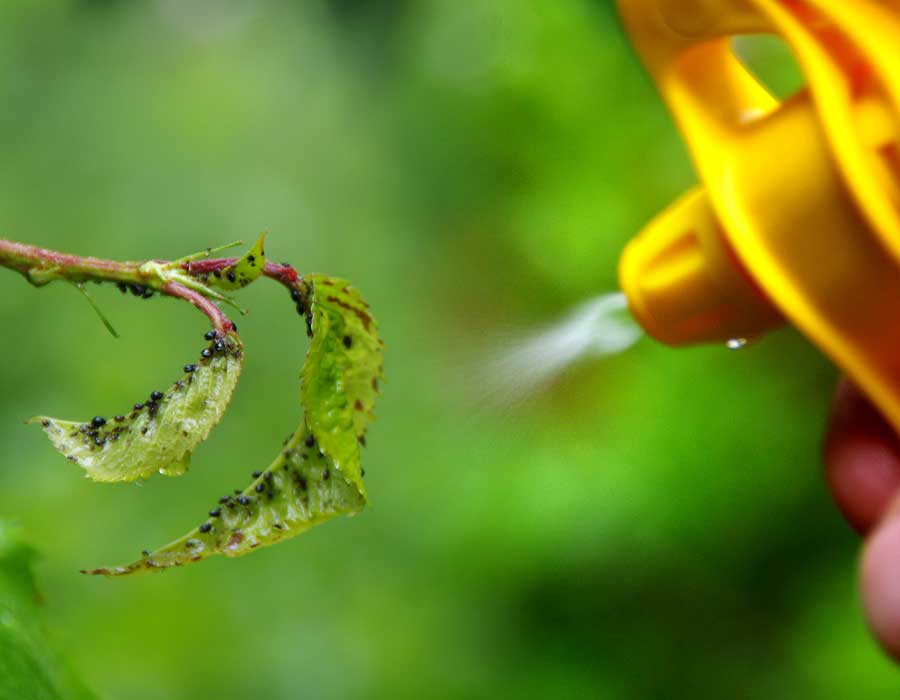
Spray Aphids with DIY Soap Spray
An easy, natural, inexpensive solution to get rid of aphids on pepper plants is to make a DIY soap spray. Soap makes an excellent ingredient in natural pesticides to kill aphids and other insects; the soap suffocates the aphids, while the fatty acids it contains dissolve the aphids’ exoskeleton. This spray also works to kill other bugs on pepper plants like mites and whiteflies.
Method:
- Make up a DIY soap spray by taking 1 teaspoon of dish soap and mixing it with water in a 32-ounce spray bottle. Shake the bottle gently to combine the soap and water.
- Test your soap spray on a small part of the pepper plant. If the plant shows no signs of damage after 24 to 48 hours, your DIY aphid spray is safe to use.
- Spray your DIY soap spray liberally on the tops and undersides of the pepper plants’ leaves.
- Monitor the plants for signs of aphid activity. You may need to repeat applications of the spray every 2 to 3 days for up to 2 weeks to completely eradicate the aphids.
Spray Aphids with Natural Vinegar Spray
You can make a natural vinegar spray for aphids from ingredients you most likely already have in your kitchen. Vinegar works as a natural pesticide as it contains acetic acid; the high acidic content of the vinegar is powerful enough to kill aphids and other insects on contact.
Method:
- Make up a vinegar solution for your DIY aphid spray. In a bucket, mix 1 tablespoon of vinegar with 1 gallon of water, before stirring well to combine them.
- Place your vinegar solution into a spray bottle or garden sprayer.
- Test your DIY aphid spray on a small portion of one of your pepper plants. Wait 24 to 48 hours before moving onto the next step; if the plant shows no signs of damage, the spray is safe to use.
- Spray your natural vinegar solution on both sides of the leaves on your pepper plants.
- Monitor the area and repeat applications of the vinegar spray every few days until you kill all aphids on your pepper plants. If your pepper plant shows signs of burn from the vinegar spray, stop using it.
Kill Aphids with Diatomaceous Earth
Diatomaceous earth is a natural substance made from powdered rocks that will kill aphids on pepper plants. The powder feels fine to the touch, however, the particles of DE are actually razor sharp.
While they won’t cause harm to people or pets, they are deadly to insects like aphids. You can also use this method to get rid of aphids on tomato plants as the powder is non-toxic.
Method:
- Purchase food-grade diatomaceous earth. This type of diatomaceous earth is certified as safe to use around people and pets.
- Put on protective gear like a pair of gloves and a mask. Although the DE is non-toxic, it may cause irritation if you inhale it, get it on your skin, or get it in your eyes.
- Wait for a week when there’s no rainfall forecast. Rain will wash away your DE and render it ineffective on the aphids.
- Sprinkle the diatomaceous earth over the entirety of the pepper plant, particularly on the tops and undersides of leaves. Then, sprinkle some more DE around the base of the plant.
- Reapply the diatomaceous earth to your pepper plants every few days until you kill all of the aphids.
- Natural Product - Composed of 2lbs of 100% ground freshwater diatomaceous earth with absolutely no additives or fillers.ground freshwater diatomaceous earth with absolutely no additives or fillers.
- OMRI Listed - Listed with the Organic Minerals Research Institute, a non-profit organization that reviews products against organic standards.
- Powder Duster Included - Powder duster in the bag for easy and efficient application of diatomaceous earth on animal feed
- Supports a Great Cause - Harris donates 10% of profits to support the local Etowah Valley Humane Society.
- Made in the USA – Mined in Nevada and packaged in Georgia
Treat Pepper Plants with Neem Oil
Neem oil is another natural substance that works to get rid of aphids on pepper plants and keep them away. This substance is derived from the seeds of the neem tree.
Neem oil works as a natural aphid killer as it contains compounds that disrupt the aphids’ hormones; this causes the insects to lose their appetite, reducing populations over time.
Method:
- Purchase neem oil. The best type of neem oil to use for this purpose is 100% cold pressed neem oil that contains azadirachtin.
- Make a solution of the neem oil by mixing it with lukewarm water and mild soap. Place the mixture in a spray bottle and shake vigorously to combine the ingredients. Take note that pure neem oil may solidify in cool or room temperatures.
- Spray the neem oil solution over your pepper plants and the surrounding soil. Avoid applying the neem oil to pepper plants under intense sunlight in the middle of the day; this puts the plants more at risk of burning.
- PURE NEEM OIL COLD PRESSED: Natural Hexane Free Cold Pressed Neem Oil with no additives or dilution Carries all the benefit of Pure Neem Oil.
- CLEAR SKIN: Neem Oil helps clear blemishes and prevent future breakouts. Restores moisture & promote soft and supple skin. Helps calm temporary redness and itchiness due to dryness, eczema, dandruff & more.
- SMOOTH AND SOFT SKIN: Neem Oil's is rich in antioxidants and essential fatty acids and Vitamin E. Great nourishment for your skin, Hair & Nails. Daily use may help diminish appearance of wrinkles, fine lines, and age spots. An Excellent Moisturizer Create your DIY skin care and hair care regimen with Neem Oil.
- NATURAL SOLUTION FOR PLANT SPRAY: Neem oil can help your houseplants vegetables and indoor plants stay healthy and green in the garden. Natural neem oil can be added to your pet shampoo to benefit your pet's coat and skin.
Use Chemical Pesticide for Aphids
For severe or extensive infestations, you may need to kill the aphids with a chemical pesticide. As is the case with any kind of chemical treatment, it’s always best to use these as a last resort when all natural methods fail.
Method:
- Purchase an appropriate systemic pesticide to kill aphids. You should choose a product containing imidacloprid; this type of pesticide is non-toxic to humans and yard-friendly insects, but will kill other pests like aphids.
- Put on protective gear before using the chemical pesticide.
- Read the safety and application instructions for your particular product. Following this guidance, apply the pesticide to your pepper plants.
- Repeat applications of the pesticide until you have eliminated all of the aphids. It may take up to two weeks of repeated applications to get rid of the infestation completely.
How to Keep Bugs Off Pepper Plants
To keep bugs like aphids off your pepper plants, methods include growing pepper companion plants, using silver foil mulch, and introducing natural aphid predators. Keeping your pepper plants well-watered and fertilized will also strengthen them against future infestations.
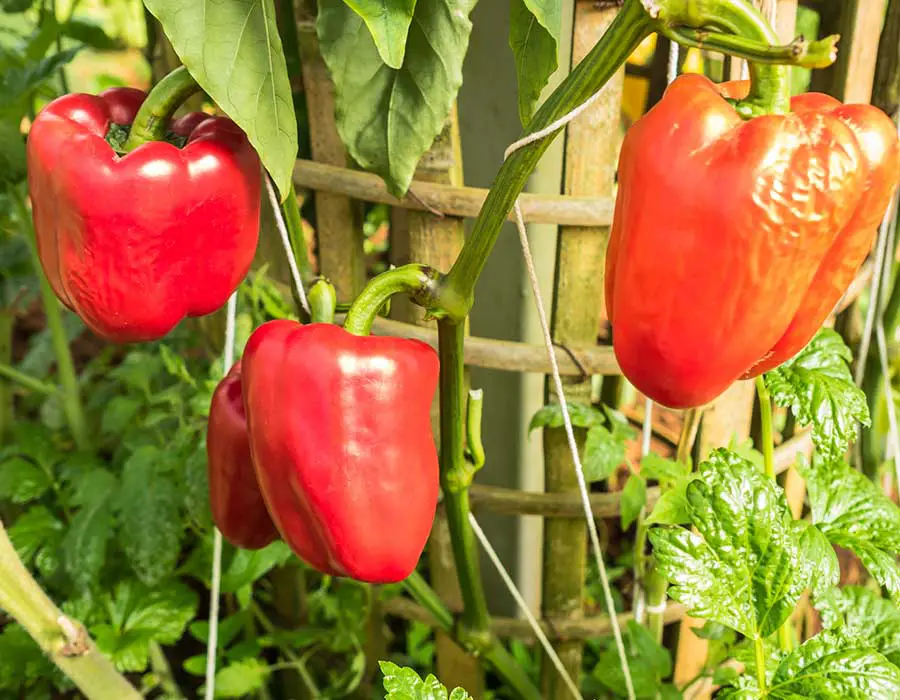
Grow Pepper Companion Plants
Companion plants are those with complementary characteristics to each other when planted in close proximity. There are several plants that, when grown next to pepper plants, can act as a natural repellent to keep bugs like aphids away.
Companion plants to keep bugs off pepper plants include:
- Alyssum
- Basil
- Beets
- Brussel sprouts
- Catnip
- Chives
- Eggplant
- Garlic
- Green beans
- Marigold
- Mint
- Onions
- Petunia
- Rosemary
- Sunflowers
- Yarrow
Avoid Overfertilizing Pepper Plants
Fertilizers are designed to give your plants a boost of nutrients, which in turn promotes fast, new growth. Insects like aphids almost exclusively feed on the new growth of pepper plants; it’s therefore important to take care with your fertilization activities to keep bugs off your pepper plants.
As best practice, you should fertilize your pepper plants using a slow-release fertilizer. You should also add this fertilizer in frequent applications of small amounts, rather than all at once. This will reduce the amount of new growth your pepper plant produces in one go. As a result, there will be less attractive new foliage for bugs like aphids to take over.
Keep Pepper Plants Watered
Another key element of caring for your pepper plants is to keep them well-watered throughout the year. When pepper plants don’t receive enough water, they become weak. This decreases the plant’s resistance to pest infestations of bugs like aphids.
Generally speaking, you should water your pepper plants at least once per week, adding about 1 inch of water. However, this frequency may vary due to rainfall, periods of hot or dry weather, and your soil type.
If you can facilitate it, drip irrigation is the best way to keep peppers watered; it’s more economical, requires less labor, and delivers water straight to the pepper plant’s roots, reducing the risk of disease.
Use Silver Foil Mulch Around Pepper Plants
Scientific studies have revealed that reflective silver foil, otherwise known as mylar foil, works as an effective insect repellent. You can keep bugs off your pepper plants using a layer of silver foil mulch in the planting area.
Silver foil mulch will repel aphids, as well as other bugs on pepper plants like slugs, snails, and ants. The foil works to repel insects by reflecting light and UV rays onto the underside of leaves; as we’ve explained, this is where destructive bugs on pepper plants like to hide.
On top of this, it will help the soil to retain moisture and improve the pepper plant’s process of photosynthesis. As a result, you’ll have thriving pepper plants that are free of invasive pests.
All you need to do is place a layer of silver mylar foil across the soil surface in the bed. Cut holes in the foil for your new or existing pepper plants and other plants in the bed. You can also use silver foil mulch on the inside or outside of plant containers.
- Reflective grow room material:Plant reflection film using safe,healthy,environmental protection,high-quality PETP(Polyethylene terephthalate) material,PETP film has excellent solar radiation transmission performance,it can be the most effective use of light reflection principle for your plants to provide lighting,to promote plant growth.
- Operating principle:Reflective film have double-sided reflection ability,it can effectively reflects the light of 95%,by reducing the"focus"of light scattered your light,let it evenly onto your plant,so as to promote the growth of plants.
- Plant protective film:Polyester film is metallized on both sides,and it can provide the most important component of your healthy indoor garden -- light.Through the reflection of light and divergent principle,make all plants have the opportunity to obtain adequate illumination,away from the cold,thus more thriving.
- Lightweight and Durability:Polyester film can be cut into different sizes according to your needs,and it comes in a separate package,easy to carry,light weight, foldable,easy to store,etc.
- Application scenario:Reflective mylar is suitable for garden greenhouse,sports warm,outdoor survival,natural disasters,accidents cover the body,etc.
Introduce Natural Aphid Predators
There are several predatory insects that feed on aphids, controlling populations in garden beds. You can prevent aphid infestations in your pepper plants by introducing and encouraging the presence of these predatory insects.
Natural aphid predators include ladybugs, hoverflies, and wasps. Ladybugs are typically available for purchase from garden centers and nurseries; all you have to do is release them into your garden to provide your pepper plants with long-term protection from aphid infestations.




